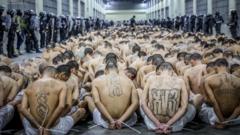In a shocking twist to US immigration and prison policies, El Salvador's President Nayib Bukele has reached a groundbreaking agreement with US Secretary of State Marco Rubio, allowing the deportation of US criminals, including US citizens and legal residents, to a mega-jail in El Salvador. This initiative, endorsed by Rubio, is part of a broader strategy by the Trump administration to expedite the deportation of undocumented migrants and serious offenders.
During his visit to the picturesque lake-side residence of Bukele, Rubio expressed his excitement about the "unprecedented" migratory agreement, noting that Bukele has offered to manage the legal transfer of criminals held in the US to El Salvador's notorious Cecot facility. Bukele confirmed his proposal to "outsource part of the prison system," indicating that only convicted criminals would be accepted in exchange for a fee.
Cecot, known as the Terrorism Confinement Centre, is one of Latin America's largest maximum-security facilities, with a capacity for around 40,000 inmates. Reports describe harsh conditions inside the prison, such as windowless cells, overcrowding, and limited movement for inmates. Critics, including human rights organizations, have raised concerns about the treatment of prisoners in such facilities, labeling it as inhumane.
President Trump has voiced support for the proposal, albeit raising questions regarding its legality. While natural-born US citizens typically enjoy protections against deportation, legal complexities could arise for naturalized citizens connected to criminal gangs. Legal experts point out that naturalized citizenship may be revoked under certain circumstances, such as fraud or criminal ties, resulting in the potential for deportation.
Moreover, lawful permanent residents in the US may face deportation for serious crimes, especially if they have been involved in activities labeled as terrorist by the government, such as those linked to notorious gangs like the Mara Salvatrucha (MS-13) and Tren de Aragua. These developments come at a turbulent time for US relations with Latin America, amid rising tensions and threats of tariffs.
Though the agreement appears to benefit Trump politically by satisfying his tough stance on crime and immigration, concerns linger over human rights conditions in El Salvador's prisons and the fine line of legality in deporting US citizens.
Looking ahead, as discussions unfold, the implications of sending US criminals to foreign facilities raise significant ethical, legal, and humanitarian questions about the future of the prison and immigration systems in both nations.






















